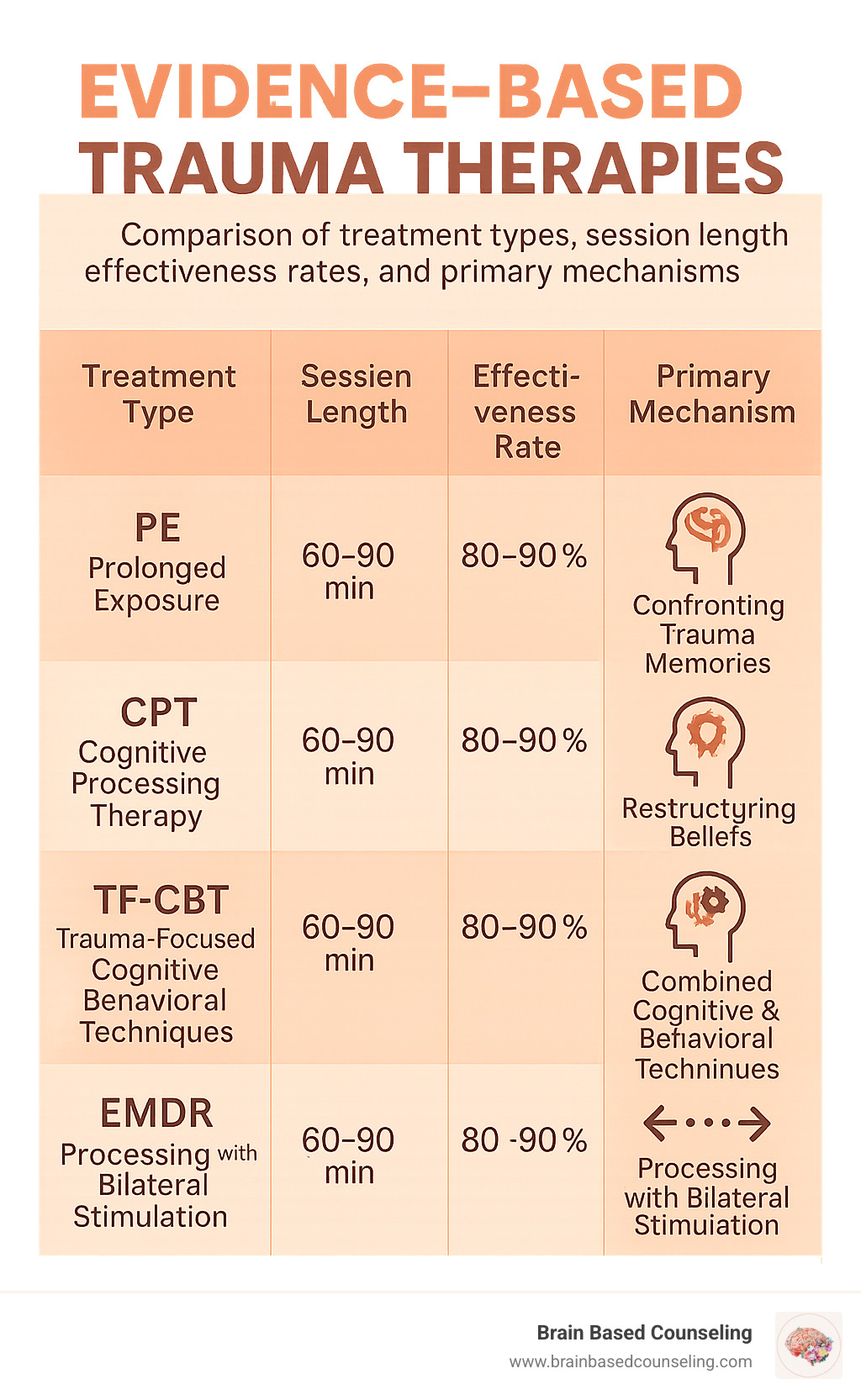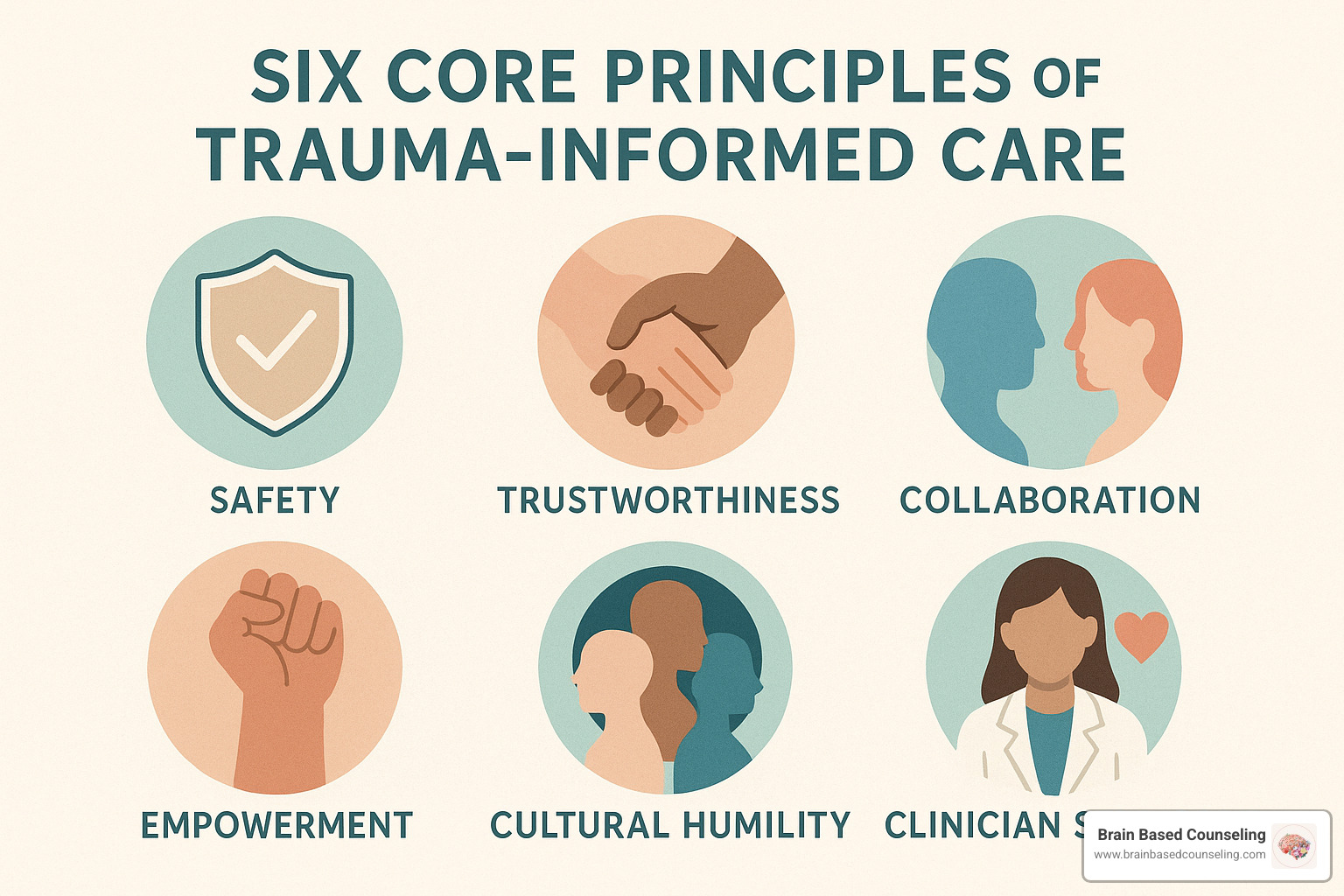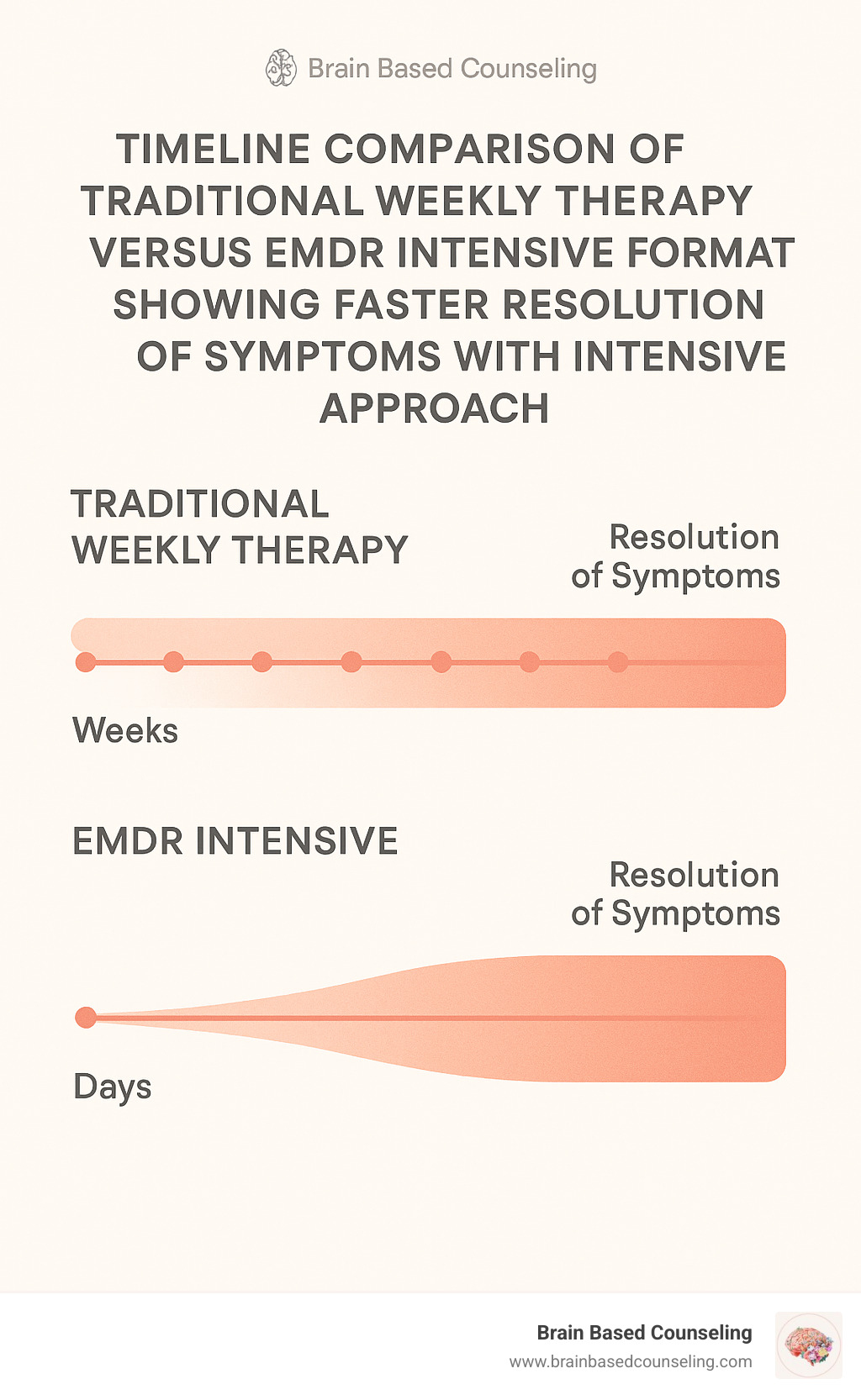Understanding Evidence-Based Trauma Therapy: A Science-Based Approach to Healing in Cincinnati

When you're a high-achieving professional juggling career demands while secretly battling anxiety, trauma, or the aftermath of betrayal, finding the right therapeutic approach becomes crucial. You don't have time for ineffective treatments or lengthy processes that keep you stuck in cycles of pain. You need evidence-based trauma therapy that delivers real, lasting results for posttraumatic stress disorder and trauma-related mental health conditions.
As Libby Murdoch, a licensed professional clinical counselor and certified clinical trauma professional specializing in neuroscience-driven healing, I understand the unique challenges facing accomplished women in Cincinnati's Indian Hill, Madeira, Mason, Hyde Park, Mount Lookout, Mount Adams, and Terrace Park communities. My solo practice, Brain Based Counseling, offers a personalized approach to trauma recovery through EMDR intensive therapy—a concentrated, science-backed treatment that fits your demanding lifestyle while addressing the root causes of your emotional distress.
What Makes Trauma Therapy "Evidence-Based"?
Evidence-based trauma therapy represents the gold standard in psychological treatments—approaches that have been rigorously tested through multiple randomized controlled trials and proven effective for reducing posttraumatic stress disorder symptoms and trauma-related mental health conditions. These aren't experimental techniques or theories someone developed last week. They're scientifically validated treatments that consistently help people heal from traumatic experiences and reduce PTSD symptoms.
The strongest evidence comes from randomized clinical trials, where participants are randomly assigned to different treatment groups. For a therapy to earn the evidence-based designation, it must consistently outperform no treatment or supportive counseling across multiple independent studies published in venues like Clinical Psychology Review. The benefits must be maintained over time, not just provide temporary relief from PTSD symptoms.
Major clinical practice guidelines from organizations like the American Psychological Association strongly recommend specific evidence-based treatment options for treating PTSD and posttraumatic stress disorder. These clinical practice guidelines help mental health professionals select the most effective treatments based on decades of PTSD treatment research.
Eye Movement Desensitization and Reprocessing (EMDR) has earned this evidence-based status through extensive randomized controlled trials. Studies consistently show that EMDR effectively treats posttraumatic stress disorder, anxiety disorders, and trauma-related symptoms by helping your brain process traumatic memories in a way that reduces their emotional charge and physical impact.
At Brain Based Counseling, I specialize exclusively in EMDR intensive therapy—a concentrated format that delivers this powerful trauma-focused treatment over 1-3 consecutive days rather than spreading it across months of weekly individual therapy sessions. This approach accelerates healing while respecting your time and commitment to recovery from posttraumatic stress.
Understanding Trauma: More Than Just Difficult Experiences
Trauma fundamentally reshapes how your brain and body function, often leading to ongoing negative effects that impact your mental health and daily functioning. According to the Substance Abuse and Mental Health Services Administration (SAMHSA), trauma results from a traumatic event or series of events experienced as physically or emotionally harmful, with lasting adverse effects on your functioning and well-being.
The Mental Health Services Administration recognizes that traumatic events can range from single incidents to complex, repeated experiences. For many high-achieving women I work with in Cincinnati's affluent communities, trauma often stems from:
Betrayal Trauma: When someone you trusted—a partner, family member, or colleague—violates that trust through infidelity, deception, or emotional manipulation. This type of traumatic event particularly damages your ability to form secure relationships and creates profound trust issues that can develop into chronic posttraumatic stress disorder.
High-Functioning Anxiety Rooted in Trauma: Past traumatic events that taught you the world isn't safe unless you maintain perfect control. Your perfectionism, hypervigilance, and impossibly high standards aren't character flaws—they're adaptive responses that once protected you from unpredictable or dangerous situations.
Professional Trauma: For first responders in the Cincinnati area—police officers, firefighters, EMTs, and healthcare workers—repeated exposure to others' trauma can lead to secondary traumatic stress and compassion fatigue, sometimes developing into chronic posttraumatic stress disorder.
Complex Trauma: Prolonged, repeated traumatic events, often occurring during childhood or other vulnerable periods, leading to difficulties with emotional regulation, relationships, and identity. Complex trauma survivors may also experience symptoms associated with borderline personality disorder.
Interpersonal Violence: Experiences of domestic violence, sexual assault, or other forms of interpersonal violence can create lasting posttraumatic stress that affects your ability to feel safe in relationships.
What's happening inside when a traumatic event occurs? Your brain's alarm system (the amygdala) goes into overdrive while your thinking center (prefrontal cortex) becomes less active. This biological response explains why trauma-related memories feel so different—they remain unprocessed, fragmented, and easily triggered by seemingly unrelated situations in your daily life.
Some individuals may initially experience acute stress disorder in the immediate aftermath of a traumatic event, which can develop into posttraumatic stress disorder if symptoms persist beyond one month.
The Neuroscience Behind Trauma: Why Your Brain Gets Stuck
Understanding the brain science behind trauma helps explain why traditional talk therapy sometimes keeps you stuck in painful narratives rather than facilitating genuine healing. When you experience a traumatic event, your brain stores these trauma-related memories differently than regular experiences.
Traumatic memories often become frozen in your nervous system, maintaining their original emotional intensity and physical sensations. This is why certain sounds, smells, or situations can instantly transport you back to feeling as vulnerable and distressed as you did during the original traumatic event, creating ongoing PTSD symptoms.
Your nervous system develops hypervigilance—constantly scanning for potential threats—which manifests as anxiety disorders, difficulty concentrating, sleep problems, and emotional reactivity. For high-achieving women, this often translates into perfectionism, over-functioning, and an exhausting need to control every aspect of life.
The groundbreaking Adverse Childhood Experiences (ACEs) research reveals how early traumatic events cast a long shadow over your entire life, creating ongoing negative effects. People with higher ACE scores face increased risks not just for mental health conditions like depression and anxiety disorders, but also for physical conditions including heart disease and autoimmune disorders.
This is where EMDR's brain-based, trauma-focused treatment approach becomes particularly powerful. Rather than just talking about trauma, EMDR works directly with how your brain processes and stores these difficult trauma-related memories, helping to unstick them from your nervous system and reduce PTSD symptom severity.

EMDR Intensive Therapy: Accelerated Healing for Busy Lives
Eye Movement Desensitization and Reprocessing (EMDR) represents a revolutionary approach to treating trauma and posttraumatic stress disorder. Developed by Dr. Francine Shapiro, EMDR is based on the Adaptive Information Processing model, which suggests that traumatic events disrupt your brain's natural healing ability. The bilateral stimulation used in EMDR—typically guided eye movements, but sometimes taps or sounds—helps restore this natural processing capacity.
What makes EMDR unique among psychological treatments is that you don't need to discuss every detail of your trauma or complete homework between therapy sessions. The bilateral stimulation appears to help your brain process trauma memory, allowing traumatic memories to be stored as regular memories rather than continuing to trigger distress and PTSD symptoms.
At Brain Based Counseling, I specialize in EMDR intensive therapy, which concentrates this powerful trauma-focused treatment into focused periods rather than weekly individual therapy sessions spread across months. This approach offers several advantages for high-achieving professionals seeking effective treatment for posttraumatic stress:
Efficiency: Complete significant healing work in days rather than months, minimizing disruption to your demanding schedule while still receiving evidence-based treatment.
Momentum: Intensive therapy sessions allow you to dive deep and make substantial progress without losing therapeutic momentum between appointments.
Privacy: Fewer total appointments mean greater discretion for professionals concerned about confidentiality when seeking mental health services.
Results: Many clients experience dramatic reduction in PTSD symptoms after just one intensive, though complex trauma may require multiple intensives.
The standard EMDR protocol includes eight distinct phases, each designed to ensure your safety and maximize healing from traumatic stress:
- History Taking: We explore your background and identify specific traumatic memories to target during our therapy sessions
- Preparation: I teach you coping skills and ensure you feel stable and resourced before processing trauma
- Assessment: We identify aspects of the target trauma memory and establish baseline measurements of PTSD symptom severity
- Desensitization: The core processing work using bilateral stimulation to reduce the emotional charge of traumatic memories
- Installation: Strengthening positive beliefs about yourself through cognitive restructuring techniques
- Body Scan: Processing any remaining physical sensations related to the traumatic event
- Closure: Ensuring you feel stable and grounded at the end of each therapy session
- Reevaluation: Assessing progress in treating PTSD and planning next steps
Trauma-Informed Care: Creating Safety from the First Moment
Before we can effectively process trauma, you need to feel genuinely safe—both physically and emotionally. This is where trauma-informed care becomes essential for any mental health professional treating trauma. It's not just about the treatment modalities I use; it's about creating an entire therapeutic environment that recognizes trauma's pervasive impact on mental health.
Trauma-informed care represents a fundamental shift from focusing on deficits to understanding experiences. This trauma-informed approach acknowledges that your experiences have shaped you and that healing begins with understanding and validation.
In my Cincinnati practice, trauma-informed care influences everything from how I've designed my office space to how I schedule individual therapy appointments and communicate with you. The foundation of trauma-informed care rests on six essential principles:
Safety: Creating spaces where you feel physically and emotionally secure, with comfortable seating, private conversation areas, and an atmosphere free from anything that might feel threatening.
Trustworthiness: Being clear about what to expect, maintaining appropriate boundaries, and following through on commitments to create the reliability many trauma survivors haven't experienced elsewhere.
Collaboration: Recognizing that healing isn't something done to you but with you. You maintain decision-making power and agency throughout the treatment process.
Empowerment: Focusing on your existing strengths and coping skills rather than just addressing problems, recognizing that you already possess many resources needed for healing.
Cultural Responsiveness: Acknowledging that your background, experiences, and identity profoundly shape how you experience both trauma and healing.
Self-Care: As your mental health professional, maintaining my own emotional health to prevent burnout and secondary traumatic stress, ensuring I can be fully present for your healing journey.
The trauma-informed approach creates the foundation for effective trauma focus in treatment, ensuring that every aspect of your care recognizes the impact of traumatic experiences on your mental health and well-being.
Specialized Expertise for Your Unique Mental Health Needs
My solo practice allows me to provide deeply personalized individual therapy tailored to your specific circumstances and mental health goals. I've completed extensive specialized training in EMDR and trauma treatment, including certification as a clinical trauma professional and advanced training in intensive therapy formats for treating PTSD.
High-Achieving Women with Anxiety Disorders
Many accomplished women in Cincinnati's professional communities carry perfectionism, hypervigilance, and rigid control patterns as adaptive responses to past traumatic events or unpredictability. On the surface, you're excelling at work and managing family responsibilities, but internally, you're carrying significant emotional burdens that affect your mental health.
You might find yourself experiencing PTSD symptoms such as:
- Setting impossibly high standards that leave you constantly stressed
- Struggling with imposter syndrome despite clear professional success
- Experiencing physical symptoms like headaches, digestive issues, or sleep problems
- Feeling emotionally exhausted from maintaining your high-functioning facade
- Having difficulty relaxing or being present with loved ones
EMDR intensive therapy works particularly well for high-functioning anxiety and posttraumatic stress because it respects your intelligence and agency while efficiently addressing root causes. You don't need to take months off work or commit to lengthy weekly individual therapy. Instead, we can accomplish significant healing in concentrated therapy sessions that fit your demanding schedule.
Betrayal Trauma Recovery
Betrayal trauma occurs when someone you depend on or trust causes harm through infidelity, deception, or emotional manipulation. This type of traumatic event is particularly damaging because it shatters your fundamental assumptions about safety and trust in relationships, often leading to chronic posttraumatic stress disorder.
If you're dealing with betrayal trauma, you might experience PTSD symptoms including:
- Difficulty trusting your own perceptions and judgment
- Hypervigilance about your partner's behavior and whereabouts
- Physical symptoms like sleep disruption, appetite changes, or chronic tension
- Emotional numbness alternating with intense anger or sadness
- Shame and self-blame despite knowing intellectually that the betrayal wasn't your fault
EMDR intensive therapy can help process the traumatic impact of betrayal while preserving your capacity for healthy relationships. The concentrated format allows you to work through multiple aspects of the betrayal trauma efficiently, reducing the emotional charge of triggering memories and rebuilding your sense of safety and self-worth.
First Responder Support
First responders face unique challenges when seeking mental health services for traumatic stress. Professional culture often values stoicism and self-reliance, making it difficult to acknowledge PTSD symptoms. Police officers, firefighters, EMTs, and healthcare workers in the Cincinnati area deal with both specific critical incidents and the cumulative impact of repeated exposure to others' trauma, which can develop into chronic posttraumatic stress disorder.
My trauma-informed approach with first responders creates a safe space that acknowledges the unique stressors of your profession. I understand the demands of shift work, the need for confidentiality, and the importance of maintaining operational readiness. EMDR intensive therapy can be particularly valuable because it allows you to address PTSD symptoms efficiently without interfering with your work schedule.
The Brain-Based Approach: Integrating Neuroscience with Mental Health Treatment
What sets Brain Based Counseling apart is my integration of cutting-edge neuroscience research from clinical psychology with proven trauma treatment techniques. Trauma isn't just stored in your memories—it lives in your nervous system, your body's automatic reactions, and your unconscious behavioral patterns, affecting your overall mental health.
The brain-based approach recognizes that:
Your Nervous System Holds the Keys: Traumatic events change your autonomic nervous system, leaving you stuck in states of hyperarousal (anxiety, anger, hypervigilance) or hypoarousal (depression, numbness, disconnection). Effective treatment must address these nervous system changes, not just cognitive symptoms.
Your Body Keeps the Score: Physical symptoms like chronic pain, digestive issues, autoimmune conditions, and sleep problems often have trauma connections. EMDR works with both psychological and somatic aspects of trauma to reduce PTSD symptom severity.
Your Brain Can Change: Neuroplasticity—your brain's ability to create new neural pathways—means that traumatic imprints aren't permanent. With the right evidence-based treatment approach, you can literally rewire your brain for greater resilience and emotional regulation.
Integration Is Essential: True healing from posttraumatic stress involves integrating traumatic memories into your broader life narrative rather than having them exist as isolated, triggering fragments.
This brain-based perspective explains why EMDR intensive therapy can produce such rapid, lasting results in treating PTSD. By working directly with your nervous system's processing capabilities using behavioral techniques and cognitive restructuring, we can often accomplish in days what might take months with other treatments.

Virtual Mental Health Services: Accessing Expert Care Throughout Ohio and North Carolina
Technology has revolutionized access to specialized mental health services for trauma treatment. Research consistently shows that trauma-focused treatments like EMDR can be effectively delivered via secure telehealth platforms with outcomes comparable to in-person individual therapy for treating posttraumatic stress disorder.
I offer virtual EMDR therapy to clients throughout Ohio and North Carolina, using HIPAA-compliant platforms and specialized techniques adapted for online delivery. This option has been particularly valuable for:
- Clients with demanding schedules who find it difficult to travel to Cincinnati for therapy sessions
- Those in rural areas without access to mental health professionals specializing in trauma treatment
- People who feel more comfortable engaging from their own safe space when addressing PTSD symptoms
- Individuals whose trauma makes leaving home challenging
Virtual therapy doesn't mean compromised care. I've adapted bilateral stimulation techniques specifically for online delivery, ensuring you receive the full benefit of EMDR even from a distance. Many clients actually prefer virtual therapy sessions because they can participate from the comfort and privacy of their own environment while still receiving effective treatment for posttraumatic stress.
For EMDR intensive therapy, I offer both virtual and in-person options. While virtual intensives can be highly effective for treating trauma, some clients prefer the dedicated healing environment of my Cincinnati office for these concentrated treatment periods. We can discuss which format might work best for your specific situation and mental health goals.
The Science of Rapid Healing: Why Intensive Formats Work
You might wonder how EMDR intensive therapy can produce lasting results in treating PTSD in just a few days when other treatments take months or years. The answer lies in understanding how your brain processes and consolidates information, based on research from clinical psychology.
Research in memory consolidation shows that intensive processing can actually be more effective than distributed sessions for certain types of learning and healing. When you engage in concentrated EMDR work for treating trauma:
Momentum Builds: Each processing session builds on the previous one without losing therapeutic momentum between appointments, leading to more consistent reduction in PTSD symptoms.
Neural Networks Activate: Sustained bilateral stimulation helps activate and integrate neural networks associated with the traumatic memories.
State-Dependent Learning: Working intensively in a healing state helps consolidate new, healthier patterns more effectively than traditional weekly therapy sessions.
Reduced Avoidance: Less time between sessions means fewer opportunities for avoidance patterns to re-establish themselves.
Studies of EMDR intensive therapy show significant reduction in PTSD symptom severity that's maintained at follow-up assessments months later. Many clients report feeling like they've turned a corner after their intensive, with continued improvement in their mental health in the weeks and months following treatment.
Addressing Potential Adverse Effects and Building Coping Skills
While EMDR is generally well-tolerated and considered safe, it's important to acknowledge that processing traumatic memories can sometimes bring up challenging emotions. During therapy sessions, some individuals may experience temporary increases in anxiety, distressing memories, or even brief spikes in depression as they begin to process traumatic experiences and work toward reducing PTSD symptoms.
These adverse effects are not uncommon and do not mean that the therapy isn't working effectively. In fact, confronting trauma memory in a safe, controlled environment is a key part of the healing process for posttraumatic stress disorder. However, it's essential for both clients and mental health professionals to be prepared for these reactions.
As a trauma-informed mental health professional, I carefully assess your readiness for trauma-focused treatment, provide ongoing support, and monitor your progress to ensure your safety and well-being throughout the process. To help manage any difficult emotions that arise, I teach various coping skills including:
- Grounding techniques to help you stay present during challenging moments
- Relaxation exercises to manage physical tension and anxiety
- Stress inoculation training to build resilience against future stressors
- Cognitive restructuring techniques to help reframe negative thoughts and reduce emotional intensity
Creating a supportive, non-judgmental therapeutic environment is crucial for minimizing risks and helping you feel empowered throughout your recovery from traumatic stress. If you ever experience adverse effects during trauma therapy, it's important to communicate openly with me. Together, we can adjust the pace of treatment, incorporate additional coping strategies, or take breaks as needed.
With the right support and evidence-based approaches, most people find that the benefits of trauma treatment far outweigh any temporary discomfort, leading to lasting improvements in mental health and quality of life.
Private Pay Benefits: Investment in Your Mental Health
Brain Based Counseling operates on an out-of-network benefits model, meaning you pay directly for mental health services and then submit claims to your insurance company for potential reimbursement. While this requires an upfront investment, it offers significant advantages for trauma treatment and mental health care:
Privacy Protection: Your mental health records remain between you and me, not in insurance databases that could affect future coverage or employment.
Treatment Freedom: I can recommend the treatment approach and intensity that will be most effective for your specific mental health needs, not what insurance companies prefer to authorize.
Quality Time: Therapy sessions aren't constrained by insurance limitations on frequency or duration, allowing for the intensive format that can accelerate your healing from posttraumatic stress.
Professional Discretion: Many high-achieving professionals in Cincinnati's business community value the confidentiality that private pay provides when seeking mental health services.
Specialized Care: Insurance companies often don't cover intensive therapy formats for treating PTSD, even though research supports their effectiveness as evidence-based treatment options.
Most clients find that the efficiency of EMDR intensive therapy actually reduces their total treatment costs compared to months or years of weekly individual therapy sessions. When you factor in the reduced time off work, fewer childcare arrangements, and faster resolution of PTSD symptoms, the private pay investment often makes both financial and practical sense for your mental health.

Addressing Potential Adverse Effects and Building Coping Skills
While EMDR is generally well-tolerated and considered safe, it's important to acknowledge that processing traumatic memories can sometimes bring up challenging emotions. During therapy sessions, some individuals may experience temporary increases in anxiety, distressing memories, or even brief spikes in depression as they begin to process traumatic experiences and work toward reducing PTSD symptoms.
These adverse effects are not uncommon and do not mean that the therapy isn't working effectively. In fact, confronting trauma memory in a safe, controlled environment is a key part of the healing process for posttraumatic stress disorder. However, it's essential for both clients and mental health professionals to be prepared for these reactions.
As a trauma-informed mental health professional, I carefully assess your readiness for trauma-focused treatment, provide ongoing support, and monitor your progress to ensure your safety and well-being throughout the process. To help manage any difficult emotions that arise, I teach various coping skills including:
- Grounding techniques to help you stay present during challenging moments
- Relaxation exercises to manage physical tension and anxiety
- Stress inoculation training to build resilience against future stressors
- Cognitive restructuring techniques to help reframe negative thoughts and reduce emotional intensity
Creating a supportive, non-judgmental therapeutic environment is crucial for minimizing risks and helping you feel empowered throughout your recovery from traumatic stress. If you ever experience adverse effects during trauma therapy, it's important to communicate openly with me. Together, we can adjust the pace of treatment, incorporate additional coping strategies, or take breaks as needed.
With the right support and evidence-based approaches, most people find that the benefits of trauma treatment far outweigh any temporary discomfort, leading to lasting improvements in mental health and quality of life.
Your Personalized Path to Mental Health Recovery
Every trauma story is unique, which means there's no standard formula for healing from posttraumatic stress. My role as your mental health professional is to create a personalized treatment plan that addresses your specific experiences, PTSD symptoms, and mental health goals while respecting your timeline and preferences.
Your healing journey at Brain Based Counseling typically begins with a comprehensive consultation where we discuss:
- Your specific trauma history and current PTSD symptoms
- How traumatic stress is impacting your daily life, relationships, and professional functioning
- Your mental health goals and what successful healing would look like for you
- Whether EMDR intensive therapy is the right evidence-based treatment for your situation
- Practical considerations like scheduling, format (in-person vs. virtual), and duration
I take time to ensure you feel fully informed and comfortable before we begin any intensive work. This might include preparatory individual therapy sessions to build coping skills, establish safety resources, and ensure you feel stable and ready for trauma processing.
During intensive therapy sessions, I closely monitor your responses and adjust the pace as needed. The goal is significant progress in treating your posttraumatic stress while maintaining your sense of safety and stability throughout the process. Many clients are surprised by how manageable the intensive format feels, even when addressing deeply painful traumatic events.
Moving Beyond Survival: Reclaiming Your Mental Health
Living with unresolved trauma means existing in survival mode—hypervigilant, emotionally exhausted, and unable to fully enjoy the life you've worked so hard to build. You might be professionally successful but privately struggling with PTSD symptoms, maintaining a perfect exterior while feeling fragmented inside.
EMDR intensive therapy offers a pathway beyond mere survival to genuine thriving and improved mental health. Clients consistently report:
Emotional Freedom: Traumatic memories lose their emotional charge, allowing you to remember what happened without being overwhelmed by the original feelings or PTSD symptoms.
Physical Relief: Chronic tension, sleep problems, and other trauma-related physical symptoms often improve dramatically as posttraumatic stress diminishes.
Relationship Enhancement: As your nervous system calms and your trust capacity rebuilds, you can be more present and authentic in relationships.
Professional Confidence: Reduced anxiety and increased self-worth often translate into greater career satisfaction and advancement.
Life Enjoyment: Perhaps most importantly, you regain your capacity for joy, spontaneity, and presence in everyday moments as PTSD symptom severity decreases.
The high-achieving women, betrayal trauma survivors, and first responders I work with in the Cincinnati area consistently express amazement at how different life feels after intensive trauma treatment. It's not that the difficult traumatic events never happened—it's that they no longer control your present-moment experience or mental health.
Taking the Next Step: Your Mental Health Healing Begins Here
If you're tired of managing PTSD symptoms and ready to address the root causes of your emotional distress, EMDR intensive therapy might be the breakthrough you've been seeking. As a solo mental health professional, I can offer the personalized attention and specialized expertise that makes intensive trauma treatment both safe and effective.
You don't have to choose between your demanding career and your mental health. You don't have to spend months or years in weekly therapy sessions that fit poorly with your schedule. The concentrated, brain-based approach I offer at Brain Based Counseling can help you reclaim your life in a timeframe that respects your other commitments and responsibilities while providing effective treatment for posttraumatic stress disorder.
From my Cincinnati practice, I serve clients throughout Indian Hill, Madeira, Mason, Hyde Park, Mount Lookout, Mount Adams, and Terrace Park, as well as virtually throughout Ohio and North Carolina. Whether you're dealing with high-functioning anxiety, betrayal trauma, professional burnout, or the lingering effects of earlier traumatic events, personalized EMDR intensive therapy can help you move from surviving to thriving.
Your trauma history has shaped you, but it doesn't have to define your future mental health. With evidence-based, neuroscience-informed treatment delivered in a format that fits your life, you can write new chapters in your story—ones filled with greater peace, authentic connection, and the joy that comes from feeling truly safe in your own skin.
Contact Brain Based Counseling today to schedule your consultation and learn more about how EMDR intensive therapy can accelerate your journey to lasting healing and mental health recovery from posttraumatic stress.

